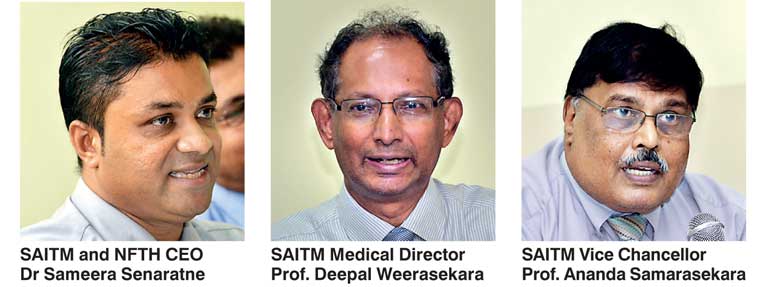Sunday Feb 22, 2026
Sunday Feb 22, 2026
Friday, 5 August 2016 00:00 - - {{hitsCtrl.values.hits}}

By Devin Jayasundera
With the SAITM fiasco continuing to escalate and with no clear resolution in sight, the management of SAITM has made aware of a possible Public-Private Partnership (PPP) with the Government.
The SAITM management stresses that the PPP will be only limited to the management of affairs and quality control of the hospital and its medical faculty with no dilution of the original ownership.
In August 2015, a special inspection committee appointed by the Sri Lanka Medical Council (SLMC) headed by eminent academic and physician Prof. Rezvi Sheriff concluded the degree awarded by SAITM should not be registered under the Medical Ordinance Act.
The committee was not satisfied with the student to patient ratio at the Neville Fernando Teaching Hospital (NFTH), stating that it was inadequate to provide the necessary clinical training for students. In the final conclusion of the report this was identified as a main deficiency of the medical education of students at SAITM stating that the general inadequacy of clinical exposure in all areas in terms of numbers and case mix was a grave concern.
In this background the PPP would offer a potential lifeline for SAITM in attracting sufficient patients to its hospital to provide the required clinical exposure as stipulated by the SLMC inspection committee. “Since SLMC has raised certain issues saying that students should be given adequate clinical exposure in terms of number of patients, we have thought to partner with the Government,” said SAITM Vice Chancellor Prof. Ananda Samarasekara.
SAITM Chairman Dr. Neville Fernando presented a concept paper outlining a PPP only for its teaching hospital to the Minister of Health and Minister of Higher Education last year. However the institute has further expressed desire in extending the PPP to its medicine faculty, according to SAITM and NFTH CEO Dr. Sameera Senarathne.
Some measures SAITM is willing to include in the PPP are the appointment of representatives from Ministry of Higher Education and Ministry of Health to its senate and council to ensure better public scrutiny and participation. The institute also intends allocate a number of seats for students who do not get selected to State medical faculties according to their Z-scores under the partnership.
The question remains on what shape the speculated PPP would take, especially in regard to SAITM’s faculty of medicine. “We are ready for a PPP in both hospital and faculty but it does not meant that this would be in anyway handed over for control of the Government,” said Dr. Senarathne.
The Government Medical Officers Association (GMOA), the principal instigator against SAITM, has consistently maintained the position that the faculty of medicine of the institute was established through illegal and fraudulent means. It also strongly persists in its insistence that both the faculty and the hospital should be nationalised.
“SAITM Chairman Dr. Neville Fernando and its Board have committed fraud in setting up the institute,” says GMOA Co-Secretary Haritha Aluthge. “On that basis there cannot be any Public-Private Partnership when the private party is an illegal entity.”
SAITM on the other hand accuses the SLMC and GMOA of double standards saying that the clinical training of some foreign medical faculties which are recognised by the SLMC are evaluated in a more relaxed and lenient manner.
SAITM Director of Medicine Prof. Deepal Weerasekara, who was also the Head of Department of Obstetrics and Gynaecology at University of Sri Jayewardenepura, claimed that Sri Lankan students studying medicine in China were not allowed in labour rooms and that they could only witness a delivery though a screen. Also in Bangladesh male medical students are not permitted to enter labour rooms. “There are students who have not assisted a single caesarean operation but SLMC continues to recognise these institutions.”
Speaking to Daily FT, SLMC Registrar Dr. Terrence De Silva denied the charges saying that foreign medical faculties recognised by SLMC were regularly evaluated and if such irregularities were to occur they would be suspended and removed from the list.
A joint statement on SAITM which was issued by the deans of the eight medical faculties recommended that Section 29 of the Medical Ordinance Act should be amended in order to allow graduates from SAITM to sit a licensing examination administered by the SLMC to obtain registration. However GOMA states that it sternly objects to such actions to amend the act and it should be done only after an elite panel discussion between the Ministry of Health, SLMC and relevant stakeholders.
Pix by Shehan Gunasekera